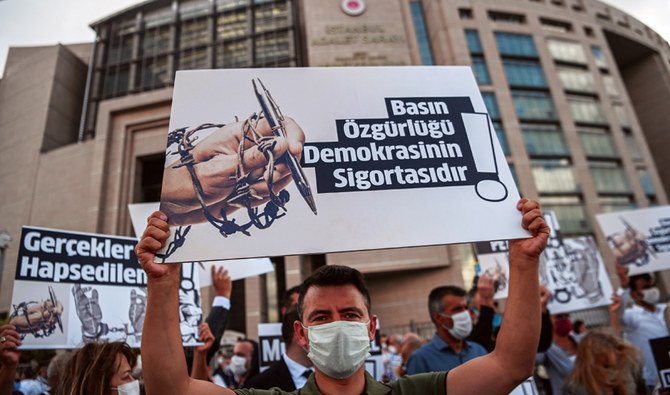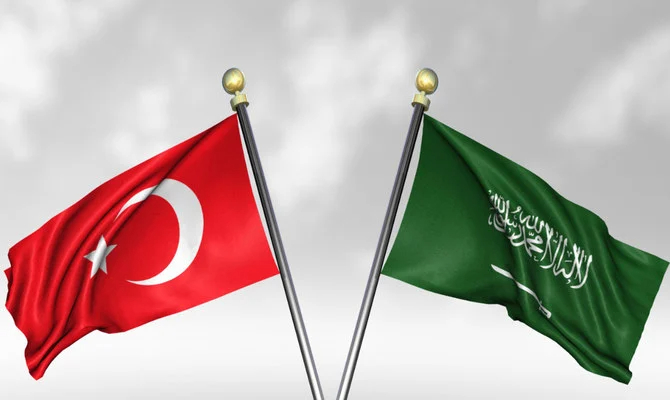ANKARA: An exhaustive new report published by the joint international press freedom mission to Turkey that took place in October reveals the extent of the country’s crackdown on media freedom in the country and calls for coordinated action from the international community to address the challenge.
The report, entitled “Turkey’s Journalists on the Ropes,” was funded by the EU and supported by 11 international organizations that focus on freedom of speech and human rights.
The mission took place against the backdrop of ongoing targeting of dissident media by the Turkish authorities, increased assaults on journalists critical of President Recep Tayyip Erdogan’s regime, and a newly introduced restrictive social-media law that is likely to further hamper the last remaining bastion in of independent reporting in the country.
The mission’s previous visit to Turkey, in September 2019, focused on the changes in trial proceedings, pre-trial detentions, the abuse of anti-terror laws to imprison dissident journalists, and potential changes that could be brought about by the Judicial Reform Strategy.
At the start of October 2020, 77 journalists were still in prison, one of the highest numbers in any country in the world. This year’s report drew attention to the controversial amnesty law announced earlier this year to ease overcrowding in Turkish prisons, which excluded journalists from its scope.
“Turkey’s press freedom crisis is worsening amid growing state capture of media, the lack of independence of regulatory institutions, and a new social media law designed to clamp down on the remaining spaces for free comment,” the report stated, adding that the lack of judicial independence in Turkey encourages the government’s crackdown on the press.
The report also criticized the new social media law, predicting that it would increase online censorship and cripple critical journalism in a space that had previously been open to the kind of independent reporting stymied by the government’s takeover of mainstream media.
HIGHLIGHT
The report, titled “Turkey’s Journalists on the Ropes,” was funded by the EU and supported by 11 international organizations that focus on freedom of speech and human rights.
One concern about the new law is that it could push companies to comply with the government’s censorship trend by removing content upon request and handing over user data to the highly politicized authorities and courts of the country — opening the way for further arrests of journalists who express dissident views online.
Last year, a total of 61,049 website domains were blocked in Turkey.
The politically motivated targeting of critical broadcasters in Turkey remains a significant problem, with regulatory bodies stepping up fines and broadcast bans on dissident TV channels and threatening to revoke their licenses if they receive a second ban, while pushing for advertising bans on critical newspapers.
“Growing authoritarianism, with the Turkish authorities trying to establish full control over the flow of information, is our main concern. They do this by different means — from jailing journalists to changing legislation to make it more difficult for journalists and media outlets to operate freely in Turkey,” Gulnoza Said, press freedom advocate and head of the Europe and Central Asia Program at the Committee to Protect Journalists, told Arab News.
Between March and August alone, there were 13 incidents of arrest or investigation of dissident journalists reporting on COVID-19 cases. Since the beginning of this year, at least 22 journalists have been arrested.
Their trials are not being held publicly, nor are lawyers permitted to attend the hearings. The authorities claim this is because of the COVID-19 pandemic, but observers have called for the government to uphold the principle of fair trials.
In November, at least 30 press-related trials were held in eight Turkish provinces, with some 40 journalists being prosecuted. Nine of those journalists were accused of insulting state officials.
“The international community must step up its bilateral and multilateral efforts to bring Turkey back into the club of countries that respects the rule of law. Human rights issues, including press freedom, must not be held hostage to geopolitical developments,” the report said.
According to Said, international leverage should still be used, but there are fewer levers now than there were years ago when Turkey aspired to become a member of the EU.
“Today, there is disenchantment with the West — both the EU and the US — in Turkey. That was coupled with the US distancing itself from playing (a central) role in defending democracy and human rights, including press freedom around the world, over the last four years. I hope the new US administration will be more vocal defending free press and independent journalists in Turkey and elsewhere,” she said.
The mission’s report welcomed some positive rulings by the Turkish Constitutional Court concerning the protection of freedom of expression online and offline. “However, lower courts increasingly ignore these rulings; for example, they have refused to lift website blockings in some cases,” the report noted.






















